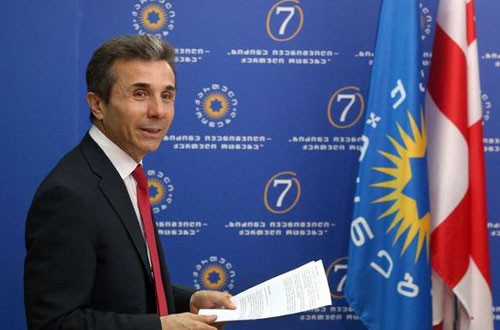| Controversy over Georgian Dream's Number on Ballot Paper |
| Civil Georgia, Tbilisi / 20 Aug.'12 / 22:19 |

Georgian Dream leader, Bidzina Ivanishvili, stands during a press conference on August 20 on the background of a banner depicting number “7” which Georgian Dream coalition insists should be its number on ballot papers in the October 1 parliamentary elections. Ivanishvili’s press office photo.
Georgian Dream opposition bloc, led by Bidzina Ivanishvili, has been assigned “41” as its number on ballot papers, instead of number “7”, which the Georgian Dream claimed it was eligible to gain and under which the bloc has already launched campaigning.
There is a set of rules in the election code based on which numbers on ballot paper are assigned to parties and election blocs. A political party, which garnered most of the votes in previous parliamentary elections, has a privilege of choosing whether it wants to retain same number on ballot paper it used in previous polls or to pick up number “1”; parties, which were second and third in previous parliamentary elections, enjoy this right to chose consecutively.
Numbers are assigned to other parties through casting lots by the Central Election Commission (CEC).
A different rule applies when it comes to assigning number to an election bloc – that is a coalition of several parties running jointly in the proportional, party-list system.
The election code says: “If an election bloc has been established by political parties, which participated in the most recent parliamentary elections, it [the bloc] shall specify in the statute of the bloc the party whose number [assigned to this party in the most recent elections] it will use.” According to the law, numbers for “all other election subject shall be determined by casting lots.”
Interpretation of this provision, as well as past practice of assigning numbers, has become source of controversy, which made the Central Election Commission target of fierce criticism from the Georgian Dream coalition for this first time ahead of the October 1 parliamentary elections.
Georgian Dream first announced about intention to use “7” as its number on ballot papers more than two months ago. This number was assigned to the Conservative Party based on its participation in the most recent parliamentary elections in 2008. The Conservative Party is now the member of six-party Georgian Dream election bloc.
The coalition’s assumption that it was eligible to this number was based on its interpretation of the relevant clause in the election code, arguing that the wording of the law did not necessarily required that all the parties within the bloc should have participated in the most recent parliamentary elections in order to retain the same number – in this case assigned to the Conservative Party. Four out of six parties within Georgian Dream ran in 2008 parliamentary elections.
But the Central Election Commission said in its English-language statement (pdf) on August 20 that the relevant clause in the election code “means that… a bloc of political parties has the right to keep the same number as the number which was assigned to one of the member political parties during the previous parliamentary elections if ALL [sic] parties in the bloc participated in the most recent elections.”
Georgian Dream’s another and major argument to back its claim is the Central Election Commission’s decision in a similar situation during the 2010 local elections when the Conservative Party used number 7 although two other parties within the bloc in which the party at the time was running in the local elections were not participants of the most recent parliamentary elections.
Georgian Dream now argues that CEC has taken decision, which contradicts a precedent established by the commission itself two years ago.
In its English-language statement the CEC does not respond to this argument directly, but brings an example of 2008 parliamentary election and recalls that at the time two parties within election bloc United Opposition participated in the previous, 2004 parliamentary elections, while others did not and consequently the bloc’s number on ballot paper was assigned by casting lots.
Activists of the Georgian Dream gathered on August 20 outside the CEC’s office in Tbilisi suburb to protest against its decision. Activists were holding banners depicting number “7” and chanting “seven, seven.”
“With this decision CEC has decided to be a party [in the electoral process] instead of being unbiased arbiter,” said Sozar Subari, ex-public defender and member of political council of Ivanishvili’s party Georgian Dream-Democratic Georgia. He also accused CEC of taking “political decisions” upon the ruling party’s instructions.
Tina Khidasheli of Republican Party, part of Georgian Dream bloc, said that the decision was a serious financial blow for the coalition, because it had already made campaign banners, booklets, t-shirts with number “7” on them.
Georgian Dream said that it would appeal the CEC’s decision to the court.
